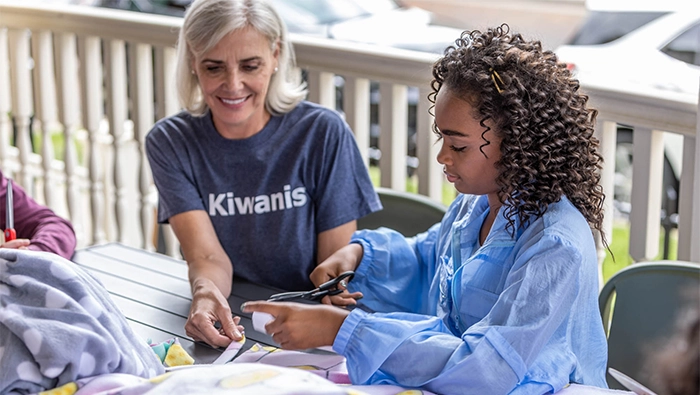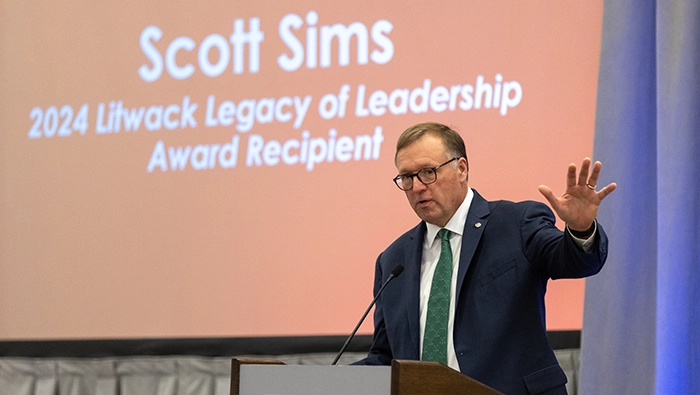
Grants help CKI do more in communities
Six Circle K International projects receive Tomorrow Fund grants.
By Erin Chandler
Circle K International members are the next generation of servant leaders — and they’re already making a difference in college and university communities around the world. The Kiwanis Children’s Fund established the Tomorrow Fund to help these clubs implement more creative solutions to problems and make the greatest possible positive impact.
This July, the Children’s Fund awarded Tomorrow Fund grants to six new CKI projects that will bring vital resources where they are needed most.
Connect, Learn and Act for Disaster Prevention
Circle K International of Ashiya University, Japan
Ashiya University CKI plans to host a disaster-preparedness course for attendees of the 2025 CKI Asia-Pacific Conference. A Tomorrow Fund grant will go toward the fees for an expert-led lecture and workshop. The course will also include a tour of a disaster-prevention experience-learning facility. Ashiya CKI members hope the clubs that take part in the experience will be motivated to host similar courses in Asian communities that commonly deal with disasters such as earthquakes, floods and tsunamis.
Literacy Kits Donation for Young Students
Circle K International of Pace University, New York, U.S.
A Tomorrow Fund grant will help Pace University CKI purchase backpacks, school supplies and hygiene kits to distribute to kids in need in New York City. CKI members will fill the backpacks with supplies and deliver them to schools participating in Jumpstart’s “Read for the Record” early literacy program. The school supplies, including copies of the book being read aloud during “Read for the Record,” will help engage kids in learning and reading, while the hygiene supplies will reduce absences and boost confidence.
Leading for Literacy: Little Free Libraries
Circle K International of the University of Alabama, U.S.
University of Alabama CKI will use its Tomorrow Fund grant to help purchase kits with all the materials necessary to build Little Free Libraries at three area Title I schools. Through this project, kids whose families might not be able to purchase books will be able to build their home libraries, practice reading outside of school and develop their love of learning. The club plans to turn its Leading for Literacy book drive into an annual event that will allow club members to continually restock each Little Free Library.
Community Book Fair
Circle K International of the University of Central Florida, U.S.
University of Central Florida CKI intends to increase literacy rates in its community’s public elementary schools by hosting a series of engaging, interactive book fairs. A Tomorrow Fund grant will help the club purchase books and school supplies, some of which will be available to students for free, and themed learning games. CKI volunteers will lead the games during the book fairs and donate them to the schools afterward. The club also intends to follow up with the participating schools, hosting storybook readings and providing tutoring where needed.
Decorating Bags for Meals on Wheels and Senior Resources
Circle K International of the University of South Carolina, U.S.
The University of South Carolina will use its Tomorrow Fund grant to purchase paper and cloth bags for the local Meals on Wheels and Senior Resources programs, as well as art supplies to decorate the bags with messages and artwork. The bags will be filled with food for community members who struggle to afford groceries or to get to the store. CKI members hope the decorated bags will help fill both the nutritional and emotional needs of those who receive them.
Once Upon a Time Literacy Service Project
Circle K International Florida District, U.S.
A Tomorrow Fund grant will help purchase supplies for the district-wide “Once Upon a Time” project to promote literacy at the 2025 CKI Florida District Convention. Participants will rotate through a variety of small service projects: making reading pointers, bottle cap letters, sight word flashcards, number flashcards, paper bag hand puppets, bookmarks and booklets. They will also write messages inside books that the Kiwanis Club of Avalon will distribute to local K-Kids. The project’s organizers hope to inspire young children to love reading and to inspire clubs to replicate these projects in their communities.
How to get involved
Does your Circle K International group have a project idea that could benefit from a Tomorrow Fund grant? Learn more about the grant and how to apply. If your Kiwanis club does not yet sponsor a CKI club, learn about the advantages of chartering one.


